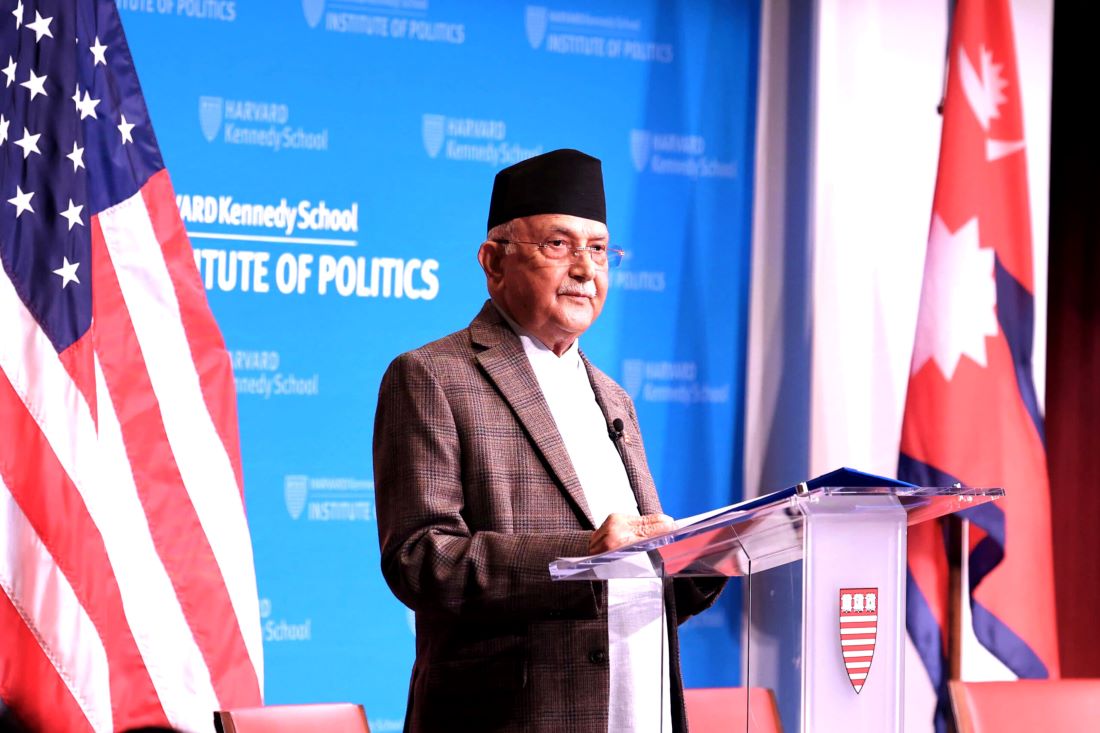
Kathmandu, Sept 28: Prime Minister KP Sharma Oli has said Nepal is determined to conclude the Transitional Justice process to heal the wounds and scars of the conflict period and help the entire society move forward with a sense of reconciliation, peace and harmony.
In his remarks on “Nepal’s Perspective: From Transitional Justice to Climate Justice” at the John F Kennedy Jr. Forum at Harvard University in Cambridge, USA on Friday afternoon local time, he said, “I want to assure you that the process of transitional justice will protect victims’ rights and interests, including legal remedies. It will involve seeking truth, providing reparation, and bringing perpetrators of serious crimes to justice.”
“No blanket amnesty will be given,” he said, “This time, my government is determined to conclude the issue of transitional justice once and for all.” He also said that Nepal welcomes support and encouragement from the international community including its partners in the process for effective implementation of the TJ Act, as Nepal moves to the last mile tasks of the peace process.
Stating that the frequent changes in the government delayed the issue of transitional justice for some 18 years after signing of the Comprehensive Peace Accord, Prime Minister Oli said, “In this context, I am happy to share that immediately after the formation of my government, the Transitional Justice bill was passed by the parliament with near consensus.”
The present government has been formed in a coalition of major two parties of Nepali politics not only to give stability but also to better deliver to Nepali people. These two political parties have a long history of leading the people for their freedom and prosperity.
The Prime Minister noted that in fact Nepal is inherently a non-violent, tolerant and peaceful society as it is the birthplace of Gautam Buddha, an apostle of peace.Talking about the second theme of the discussion i.e. climate change, Prime Minister Oli said developed countries and major economies must take proportionate responsibility to support developing nations for climate actions, through adequate resources and technology transfer.
The whole world is suffering but the least developed countries are suffering the most as they do not have resources and technologies to manage adverse impacts of climate change, he said, “This is a gross injustice meted out by the advanced industrialized economies with their centuries of exploitation of nature and emissions of greenhouse gas that are largely responsible for the global ecological harms, endangering our very existence.”
Prime Minister Oli said if we truly believe in democracy and justice at a global level, then wealthy nations who are responsible for climate damage must compensate for the loss and damage of essential infrastructures and livelihoods of people in vulnerable countries.
The establishment of a “Loss and Damage” fund in the recent UN Climate Change conference was a positive step in recognizing the principle of climate justice, whereby those most responsible for emissions should cover the damages. “And for us, climate justice is plain and simple: those who pollute the environment have to pay proportionately,” the Prime Minister noted.
He was of the view that as the stakes are nothing less than our collective existence the world cannot continue with a wrong model of carbon intensive development. “We must take proportionate actions to limit global warming and climate change, preserve nature, transition to greener economies and embrace a sustainable path forward.”
Moreover, while we have just started to make initial steps for economic development, the problem of global warming and climate change has come our way with increased incidence of disasters. “It came to us from the outside world, far from our borders. The cumulative impact of hundreds of years of burning of fossil fuels have largely created these catastrophic problems,” he said.
Despite being one of the lowest emitters of greenhouse gases, Nepal is one of the most climate vulnerable countries. We have become a barometer of climate change. However, Nepal has hugely been contributing to the health of our planet through its forests, mountains and rivers. Yet, despite these efforts, we continue to bear the brunt of climate change, created largely by the actions of industrialized nations.
“Our mountains play a crucial role in regulating the climate and ecosystem of oceans and mountains, with their snow-fed rivers flowing down to the oceans. Nepal’s Himalayas, as a natural climate stabilizer, help maintain a cooling system in a region situated the hottest zone of the planet between the tropics of Cancer and Capricorn.”Prime Minister Oli noted that Nepal’s Himalayas are losing their ice at an alarming rate endangering the lives and livelihood of billions of people based on the river system originated from the Himalayas.
Neither the heat of the hottest regions nor the ice of the cold poles caused this destruction. It is humanity that has harmed nature, and in turn, nature is contributing to the climate crisis. Therefore, it is our responsibility to protect nature, and in doing so, we must preserve our mountains and forests.
He also shared that Nepal has set an ambitious goal of reaching net zero by 2045, five years ahead of the global target. “The climate crisis is an unprecedented crisis that engulfs the entire planet. Therefore, it requires commitments, solidarity and collective action on an unprecedented scale.”
On a different note, the Prime Minister said that the Constitution of Nepal guarantees a competitive multiparty democratic system of governance, civil liberties, fundamental rights, human rights, full freedom of the press and concept of the rule of law with a view to building an inclusive and prosperous nation. “In a nutshell, our Constitution comprehensively addresses the underlying drivers and catalysts of conflict through substantial social, political and economic reforms.”
Comments